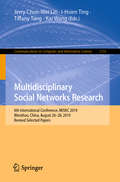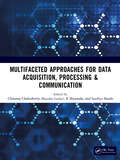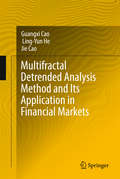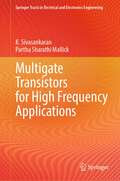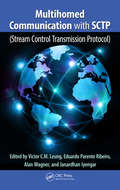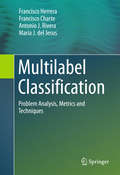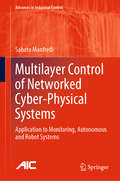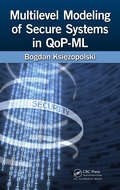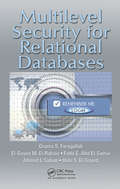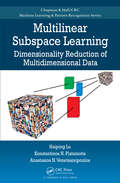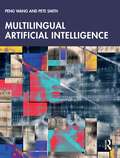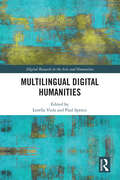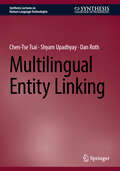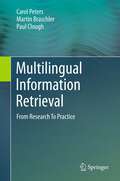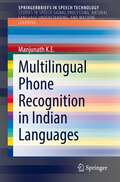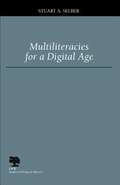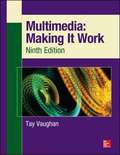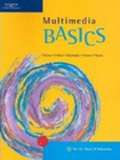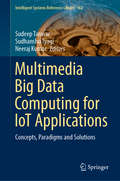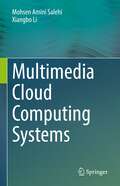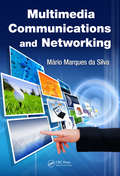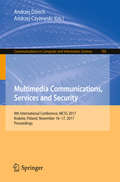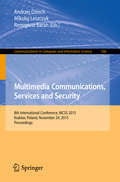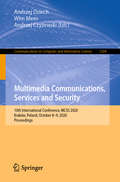- Table View
- List View
Multidisciplinary Social Networks Research: 6th International Conference, MISNC 2019, Wenzhou, China, August 26–28, 2019, Revised Selected Papers (Communications in Computer and Information Science #1131)
by I-Hsien Ting Tiffany Tang Jerry Chun-Wei Lin Kai WangThis book constitutes the refereed proceedings of the 6th International Conference on Multidisciplinary Social Networks Research, MISNC 2019, held in Wenzhou, China, in August 2019. The 15 full papers presented were carefully reviewed and selected from 37 submissions. The papers deal with the following topics: social network, social network analysis, data engineering, data mining, user behavior.
Multifaceted approaches for Data Acquisition, Processing & Communication
by K. Shyamala Chinmay Chakraborty Manisha Guduri B. SandhyaThe objective of the conference is to bring to focus the recent technological advancements across all the stages of data analysis including acquisition, processing, and communication. Advancements in acquisition sensors along with improved storage and computational capabilities, have stimulated the progress in theoretical studies and state-of-the-art real-time applications involving large volumes of data. This compels researchers to investigate the new challenges encountered, where traditional approaches are incapable of dealing with large, complicated new forms of data.
Multifractal Detrended Analysis Method and Its Application in Financial Markets
by Jie Cao Guangxi Cao Ling-Yun HeThis book collects high-quality papers on the latest fundamental advances in the state of Econophysics and Management Science, providing insights that address problems concerning the international economy, social development and economic security. This book applies the multi-fractal detrended class method, and improves the method with different filters. The authors apply those methods to a variety of areas: financial markets, energy markets, gold market and so on. This book is arguably a systematic research and summary of various kinds of multi-fractal detrended methods. Furthermore, it puts forward some investment suggestions on a healthy development of financial markets.
Multigate Transistors for High Frequency Applications (Springer Tracts in Electrical and Electronics Engineering)
by Partha Sharathi Mallick K. SivasankaranThis book discusses the evolution of multigate transistors, the design challenges of transistors for high-frequency applications, and the design and modeling of multigate transistors for high-frequency applications. The contents particularly focus on the cut-off frequency and maximum oscillation frequency of different multigate structures. RF stability modeling for multigate transistors is presented, which can help to understand the relation between the small-signal parameter and the physical parameter of the device for optimization. This is a useful reference to those in academia and industry.
Multihomed Communication with SCTP (Stream Control Transmission Protocol)
by Victor C.M. Leung Alan Wagner Janardhan Iyengar Eduardo Parente RibeiroAlthough multihomed communication is a rapidly emerging trend for next generation networks, no known book explores multihomed communication with the Stream Control Transmission Protocol (SCTP). Filling this void, Multihomed Communication with SCTP (Stream Control Transmission Protocol) explains this innovative feature that allows an endpoint to sim
Multilabel Classification
by Francisco Herrera Francisco Charte Antonio J. Rivera María J. JesusThis book offers a comprehensive review of multilabel techniques widely used to classify and label texts, pictures, videos and music in the Internet. A deep review of the specialized literature on the field includes the available software needed to work with this kind of data. It provides the user with the software tools needed to deal with multilabel data, as well as step by step instruction on how to use them. The main topics covered are: * The special characteristics of multi-labeled data and the metrics available to measure them. * The importance of taking advantage of label correlations to improve the results. * The different approaches followed to face multi-label classification. * The preprocessing techniques applicable to multi-label datasets. * The available software tools to work with multi-label data. This book is beneficial for professionals and researchers in a variety of fields because of the wide range of potential applications for multilabel classification. Besides its multiple applications to classify different types of online information, it is also useful in many other areas, such as genomics and biology. No previous knowledge about the subject is required. The book introduces all the needed concepts to understand multilabel data characterization, treatment and evaluation.
Multilayer Control of Networked Cyber-Physical Systems: Application to Monitoring, Autonomous and Robot Systems (Advances in Industrial Control)
by Sabato ManfrediThis book faces the interdisciplinary challenge of formulating performance-assessing design approaches for networked cyber-physical systems (NCPSs). Its novel distributed multilayer cooperative control deals simultaneously with communication-network and control performance required for the network and application layers of an NCPS respectively. Practically, it distributes the computational burden among different devices, which act cooperatively to achieve NCPS goals. The approach can be applied to NCPSs based on both wired and wireless technologies and so is suitable for future network infrastructures in which different protocols and technologies coexist. The book reports realistic results from performance evaluation of the new approach, when applied in different operative scenarios. Readers of this book will benefit by: learning a general, technology-independent methodology for the design and implementation of cooperative distributed algorithms for flow control at the network layer of an NCPS that gives algorithm-parameter-tuning guidelines for assessing the desired quality of service performance; learning a general methodology for the design and implementation of consensus-based algorithms at the application layer that allows monitoring and control of distributed physical systems and gives algorithm-parameter-tuning guidelines for assessing the desired control system performance; understanding the main network simulators needed to validate the effectiveness of the proposed multilayer control approach in different realistic network operation scenarios; and practising with a cooperative multilayer control project that assesses acceptable NCPS performance in networked monitoring and robot systems, autonomous and queuing networks, and other critical human relief applications. Researchers, graduate students and practitioners working in automation, engineering, sensor networks, mobile robotics and computer networks will find this book instructive. It will also be helpful to network administrators and technicians implementing application-layer and network-layer solutions or installing, configuring or troubleshooting network and control system components of NCPSs.
Multilevel Modeling of Secure Systems in QoP-ML
by Bogdan KsiezopolskiIn order to perform effective analysis of today's information security systems, numerous components must be taken into consideration. This book presents a well-organized, consistent solution created by the author, which allows for precise multilevel analysis of information security systems and accounts for all of the significant details. Enabling t
Multilevel Security for Relational Databases
by Osama S. Faragallah El-Sayed M. El-Rabaie Fathi E. El-Samie Ahmed I. Sallam Hala S. El-SayedSince databases are the primary repositories of information for today's organizations and governments, database security has become critically important. Most database security models focus on protecting against external unauthorized users. Because multilevel secure databases provide internal security according to user access type, they are a viable option for the security needs of modern database systems. Covering key concepts in database security, this book illustrates the implementation of multilevel security for relational database models. It considers concurrency control in multilevel database security and presents encryption algorithms. It also includes simulation programs and Visual studio and Microsoft SQL Server code for the simulations covered in the text.
Multilinear Subspace Learning: Dimensionality Reduction of Multidimensional Data (Chapman & Hall/CRC Machine Learning & Pattern Recognition)
by Haiping Lu Konstantinos N. Plataniotis Anastasios VenetsanopoulosDue to advances in sensor, storage, and networking technologies, data is being generated on a daily basis at an ever-increasing pace in a wide range of applications, including cloud computing, mobile Internet, and medical imaging. This large multidimensional data requires more efficient dimensionality reduction schemes than the traditional techniqu
Multilingual Artificial Intelligence
by Pete Smith Peng WangMultilingual Artificial Intelligence is a guide for non-computer science specialists and learners looking to explore the implementation of AI technologies to solve real-life problems involving language data.Focusing on multilingual, multicultural, pre-trained large language models and their practical use through fine-tuning and prompt engineering, Wang and Smith demonstrate how to apply this new technology in areas such as information retrieval, semantic webs, and retrieval augmented generation, to improve both human productivity and machine intelligence. Finally, they discuss the human impact of language technologies in the cultural context, and provide an AI competence framework for users to design their own learning journey.This innovative text is essential reading for all students, professionals, and researchers in language, linguistics, and related areas looking to understand how to integrate multilingual and multicultural artificial intelligence technology into their research and practice.
Multilingual Digital Humanities (Digital Research in the Arts and Humanities)
by Paul Spence Lorella ViolaMultilingual Digital Humanities explores the impact of monolingualism—especially Anglocentrism—on digital practices in the humanities and social sciences. The volume explores a wide range of applied contexts, such as digital linguistic injustice, critical digital literacy, digital learning, digital publishing, low-resourced, minoritised or endangered languages in a digital space, and multilingual historical intertextuality. These discussions are situated within wider work on language technologies, language documentation and international (in particular European) language-based infrastructure creation. Drawing on both primary and secondary research, this four-part book features 13 diverse case studies of infrastructural projects, pedagogical resources, computational models, interface building, and publishing initiatives in a range of languages, including Arabic, French, Russian, Portuguese, Italian, German, Spanish, Bengali, Hindi, Malayalam, and Tamil. All the debates are contextualised within a wider cultural frame, thus bridging the gap between the linguistic focus of the multilingual initiatives and wider discussion of cultural criticism in DH. Multilingual Digital Humanities recognizes the digital as a culturally situated and organic multilingual entity embedding past, present, and future worlds, which reacts to and impacts on institutional and methodological frameworks for knowledge creation. It is essential reading for students, scholars, and practitioners working in digital humanities and digital studies.
Multilingual Digital Humanities (ISSN)
by Paul Spence Lorella ViolaMultilingual Digital Humanities explores the impact of monolingualism—especially Anglocentrism—on digital practices in the humanities and social sciences.The volume explores a wide range of applied contexts, such as digital linguistic injustice, critical digital literacy, digital learning, digital publishing, low-resourced, minoritised or endangered languages in a digital space, and multilingual historical intertextuality. These discussions are situated within wider work on language technologies, language documentation and international (in particular European) language-based infrastructure creation. Drawing on both primary and secondary research, this four-part book features 13 diverse case studies of infrastructural projects, pedagogical resources, computational models, interface building, and publishing initiatives in a range of languages, including Arabic, French, Russian, Portuguese, Italian, German, Spanish, Bengali, Hindi, Malayalam, and Tamil. All the debates are contextualised within a wider cultural frame, thus bridging the gap between the linguistic focus of the multilingual initiatives and wider discussion of cultural criticism in DH. Multilingual Digital Humanities recognizes the digital as a culturally situated and organic multilingual entity embedding past, present, and future worlds, which reacts to and impacts on institutional and methodological frameworks for knowledge creation. It is essential reading for students, scholars, and practitioners working in digital humanities and digital studies.
Multilingual Entity Linking (Synthesis Lectures on Human Language Technologies)
by Dan Roth Chen-Tse Tsai Shyam UpadhyayThis book focuses on Entity Discovery and Linking (EDL), which is the problem of identifying concepts and entities, disambiguating them, and grounding them to one or more knowledge bases (KBs). The authors first provide background on the topic and emphasize why it is a crucial step toward understanding natural language text. As most of the content on the internet is not in English, the book also discusses cross-lingual EDL. The authors present the challenges associated with EDL problems and explain the existing solutions. The book covers the core challenges that apply to all EDL problems, as well as the additional challenges associated with cross-lingual EDL problems. The authors also survey relevant research papers, highlight recent trends, and identify areas for future research.
Multilingual Information Retrieval
by Carol Peters Martin Braschler Paul CloughWe are living in a multilingual world and the diversity in languages which are used to interact with information access systems has generated a wide variety of challenges to be addressed by computer and information scientists. The growing amount of non-English information accessible globally and the increased worldwide exposure of enterprises also necessitates the adaptation of Information Retrieval (IR) methods to new, multilingual settings. Peters, Braschler and Clough present a comprehensive description of the technologies involved in designing and developing systems for Multilingual Information Retrieval (MLIR). They provide readers with broad coverage of the various issues involved in creating systems to make accessible digitally stored materials regardless of the language(s) they are written in. Details on Cross-Language Information Retrieval (CLIR) are also covered that help readers to understand how to develop retrieval systems that cross language boundaries. Their work is divided into six chapters and accompanies the reader step-by-step through the various stages involved in building, using and evaluating MLIR systems. The book concludes with some examples of recent applications that utilise MLIR technologies. Some of the techniques described have recently started to appear in commercial search systems, while others have the potential to be part of future incarnations. The book is intended for graduate students, scholars, and practitioners with a basic understanding of classical text retrieval methods. It offers guidelines and information on all aspects that need to be taken into consideration when building MLIR systems, while avoiding too many 'hands-on details' that could rapidly become obsolete. Thus it bridges the gap between the material covered by most of the classical IR textbooks and the novel requirements related to the acquisition and dissemination of information in whatever language it is stored.
Multilingual Phone Recognition in Indian Languages (SpringerBriefs in Speech Technology)
by K.E ManjunathThe book presents current research and developments in multilingual speech recognition. The author presents a Multilingual Phone Recognition System (Multi-PRS), developed using a common multilingual phone-set derived from the International Phonetic Alphabets (IPA) based transcription of six Indian languages - Kannada, Telugu, Bengali, Odia, Urdu, and Assamese. The author shows how the performance of Multi-PRS can be improved using tandem features. The book compares Monolingual Phone Recognition Systems (Mono-PRS) versus Multi-PRS and baseline versus tandem system. Methods are proposed to predict Articulatory Features (AFs) from spectral features using Deep Neural Networks (DNN). Multitask learning is explored to improve the prediction accuracy of AFs. Then, the AFs are explored to improve the performance of Multi-PRS using lattice rescoring method of combination and tandem method of combination. The author goes on to develop and evaluate the Language Identification followed by Monolingual phone recognition (LID-Mono) and common multilingual phone-set based multilingual phone recognition systems.
Multiliteracies for a Digital Age
by Stuart A. SelberThis is a guide for composition teachers to develop effective, full-scale computer literacy programs that are also professionally responsible by emphasizing different kinds of literacies and proposing methods for helping students move among them in strategic ways.
Multimedia - Making It Work
by Tay VaughanThe Most Complete, Up-to-Date Multimedia Guide Thoroughly updated to cover the latest technologies, including mobile multimedia, this full-color resource prepares you for a successful multimedia career by teachingyou the fundamental concepts and required skills. Multimedia: Making It Work, Ninth Edition explains how to integrate text, images, sound, animation, and video into compelling projects. Multimedia project planning, costs, design, production, talent acquisition, testing, and delivery are also discussed. Chapter-ending quizzes reinforce key concepts and hands-on lab projects allow you to apply your new skills. Learn how to: Master the essential elements of multimedia, including text, images, sound, animation, and video Incorporate bitmap, vector, and 3-D images Record and edit digital audio and use MIDI Create computer-generated animations Shoot and edit digital video Select the best hardware, software, and authoring tools for your project Determine the scope and cost of a multimedia projectn Design, produce, and test your project Acquire the best content and talent for your budget Design dynamic Web content Create apps for mobile devices, including tablets, readers, and smartphones Deliver multimedia over the Internet, in an app store, and on CD-ROM and DVD Each chapter includes: Learning objectives Full-color illustrations and screenshots Helpful notes, tips, and warnings Chapter summaries and key term lists End-of-chapter quizzes and lab projects This book is intended for students enrolled in an instructor-led course and does not provide correct answers for the end-of-chapter quizzes or access to the instructor's resource materials. If you are an instructor, please contact your McGraw-Hill Education sales representative for details.
Multimedia Basics
by Jennifer Fulton Suzanne Weixel Karl Barksdale Cheryl Morse Bryan MorseAn excellent foundation for any multimedia or website design curriculum, this textbook provides comprehensive coverage of many multimedia topics including graphics, animation, video, presentations, desktop publishing, and web pages.
Multimedia Big Data Computing for IoT Applications: Concepts, Paradigms and Solutions (Intelligent Systems Reference Library #163)
by Neeraj Kumar Sudeep Tanwar Sudhanshu TyagiThis book considers all aspects of managing the complexity of Multimedia Big Data Computing (MMBD) for IoT applications and develops a comprehensive taxonomy. It also discusses a process model that addresses a number of research challenges associated with MMBD, such as scalability, accessibility, reliability, heterogeneity, and Quality of Service (QoS) requirements, presenting case studies to demonstrate its application. Further, the book examines the layered architecture of MMBD computing and compares the life cycle of both big data and MMBD. Written by leading experts, it also includes numerous solved examples, technical descriptions, scenarios, procedures, and algorithms.
Multimedia Cloud Computing Systems
by Mohsen Amini Salehi Xiangbo LiThe second generation of cloud computing systems, known as domain-specific clouds, are emerging based on application-specific processors and serverless computing paradigm. As multimedia streaming services are increasingly growing in popularity and diversity, this book is authored to introduce “multimedia clouds” as a domain-specific cloud that operates in the intersection of cloud computing technologies and digital media streaming. The book concentrates on the architectural aspects of multimedia clouds and describes development of high-level abstractions that will mitigate the burden of programmers, cloud architects, and system administrators. Multimedia clouds not only democratize multimedia streaming and add flexibility to the streaming services, they also help stream providers to offer robust and reliable streaming services in a cost- and energy-efficient manner.
Multimedia Communications and Networking
by Mario Marques da SilvaThe result of decades of research and international project experience, Multimedia Communications and Networking provides authoritative insight into recent developments in multimedia, digital communications, and networking services and technologies. Supplying you with the required foundation in these areas, it illustrates the means that will allow
Multimedia Communications, Services and Security
by Andrzej Dziech Andrzej CzyżewskiThis book constitutes the refereed proceedings of the 4th International Conference on Multimedia Communications, Services and Security, MCSS 2011, held in Krakow, Poland, in June 2011. The 42 revised full papers presented were carefully reviewed and selected from numerous submissions. Topics addresses are such as audio-visual systems, service oriented architectures, multimedia in networks, multimedia content, quality management, multimedia services, watermarking, network measurement and performance evaluation, reliability, availability, serviceability of multimedia services, searching, multimedia surveillance and compound security, semantics of multimedia data and metadata information systems, authentication of multimedia content, interactive multimedia applications, observation systems, cybercrime-threats and counteracting, law aspects, cryptography and data protection, quantum cryptography, object tracking, video processing through cloud computing, multi-core parallel processing of audio and video, intelligent searching of multimedia content, biometric applications, and transcoding of video.
Multimedia Communications, Services and Security
by Andrzej Dziech Mikołaj Leszczuk Remigiusz BaranThis volume constitutes the refereed proceedings of the 8th International Conference on Multimedia Communications, Services and Security, MCSS 2015, held in Krakow, Poland, in November 2015. The 16 full papers included in the volume were selected from 39 submissions. The papers cover ongoing research activities in the following topics: multimedia services; intelligent monitoring; audio-visual systems; biometric applications; experiments and deployments.
Multimedia Communications, Services and Security: 10th International Conference, MCSS 2020, Kraków, Poland, October 8-9, 2020, Proceedings (Communications in Computer and Information Science #1284)
by Andrzej Dziech Andrzej Czyżewski Wim MeesThis volume constitutes the refereed proceedings of the 10th International Conference on Multimedia Communications, Services and Security, MCSS 2020, held in Kraków, Poland, in October 2020. The 24 full papers and 2 short papers included in the volume were selected from 54 submissions. The papers cover ongoing research activities in the following topics: multimedia services; intelligent monitoring; audio-visual systems; biometric applications; experiments and deployments.
